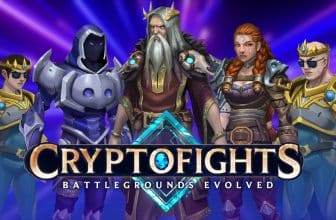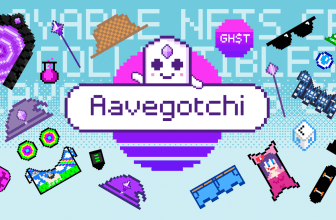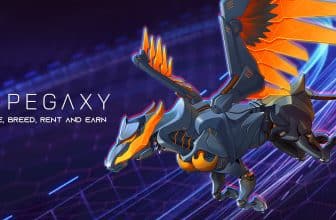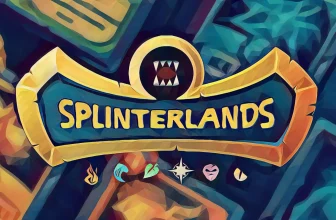Do you remember when the Crypto Gaming industry first happened in 2018? There weren’t many games of high quality, and developers primarily developed projects that we would typically classify as scams.
However, in this Gods Unchained review, we will talk about a very significant game in the first days of the industry, simply because it was so different. I believe everyone remotely interested in the crypto industry has heard of this game.
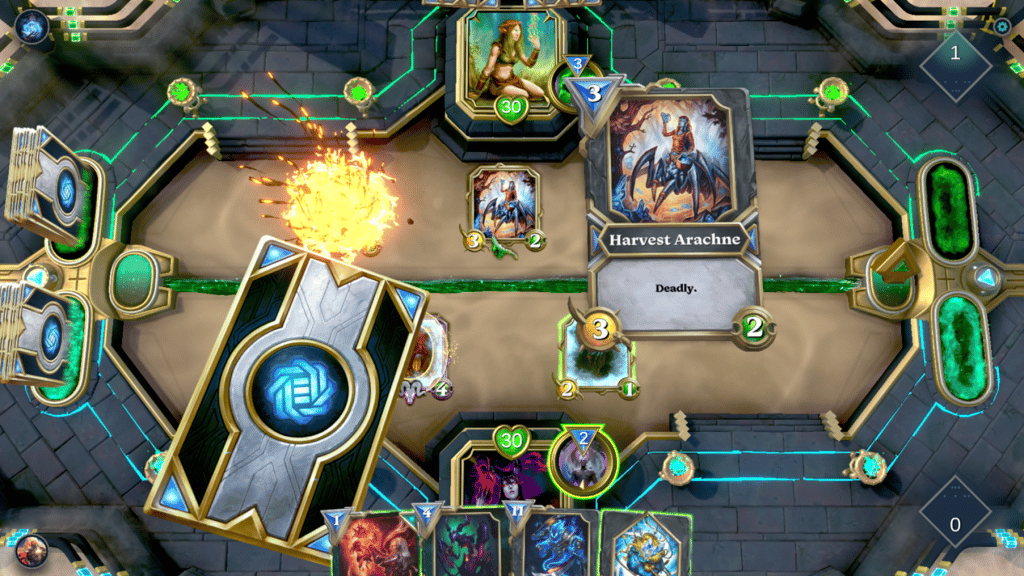
Gods Unchained has undergone significant changes in its development from 2018 to 2022. The game’s logic was based on the dynamics of card games like Magic: The Gathering and Hearthstone.
With the help of NFT convertible cards, players had to make strategic moves to defeat their opponents. In fact, when we look back at 2018 and the crypto community, developing Gods Unchained on the Ethereum network was a huge success.
This is precisely the reason I chose to review it thoroughly. We’ll analyze everything about it, starting from the gameplay to the tokeconomic system. Let’s get started!
Graphics & Design (9)
Before I get into the graphics and design of Gods Unchained, I must confess that I am a card game addict. So you’ll be able to hear both my constructive and destructive criticism about the game.
First, the game’s gameplay and input interface have been developed in a very high-quality way. In fact, the design on the hundreds of different cards seems to support the intention of creating an incredible story.
Gods Unchained’s gameplay trailer from 2018 shows that there aren’t many differences between it and its newest version from 2022.
And since this is a card game, this is precisely how it should always be. I associate card games with strategic gameplay mechanics rather than fantastic graphics.
You may better understand what I mean if you’ve played Magic: The Gathering or Hearthstone.
Magic: The Gathering was created in 1993 and released on PC in 2011. The graphic design will likely remind you of web browser games.
There are other card games, but none compares to Magic: The Gathering in terms of quality and gameplay dynamics.
This was exactly what Gods Unchained aimed to achieve. It received a good score from me despite not having graphics as good as Hearthstone.
It’s just that the game’s design made it difficult for me to understand what to do when I first logged in and entered a random match.
The game provides a selection of cards but doesn’t give us any notices before the opponent chooses a card. The login page design is also quite intricate.
Even though everything is easily accessible from the top menu, I must say it’s excogitative.
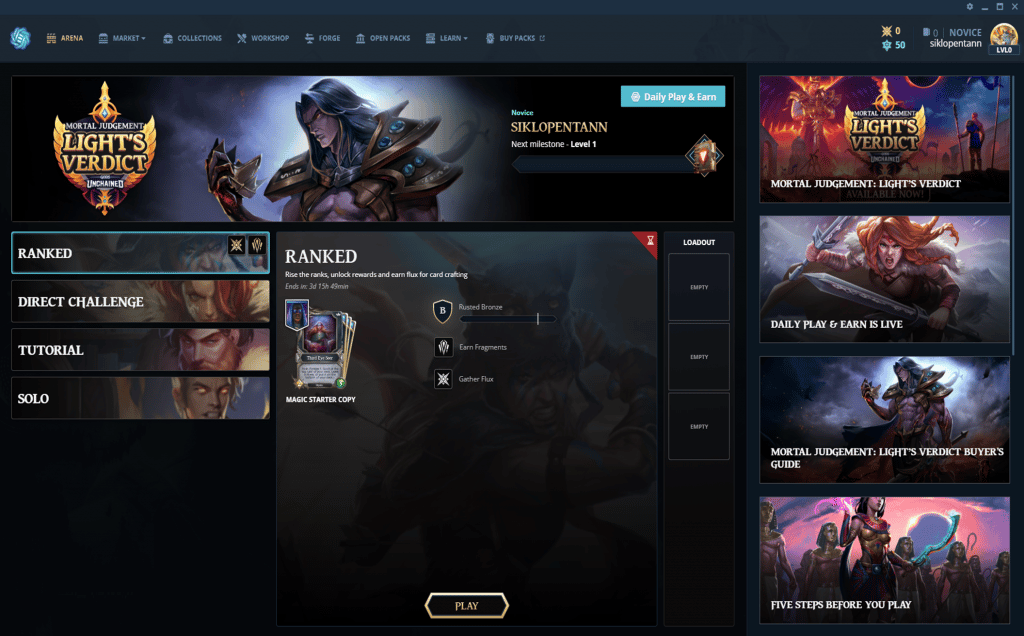
I’m satisfied with the gameplay part. As I said before – The gameplay mechanics, not the graphics, determine the quality of a card game.
So, let’s take a look at the gameplay.
Gods Unchained Review: Gameplay (8)
As a pay-to-earn game, Gods Unchained is regarded as one of the pioneers of the cryptocurrency gaming industry. Gods tokens are given to players who win in competitive matches or events.
Eventually, the excitement of card games can increase if there is an actual money prize involved. How fun to play is Gods Unchained? Let’s see.
Both players must first select one of the 6 gods for themselves before the game can begin. Each God, however, has unique features and synergies with other cards.
Before starting the game, making your choice of a God will help you decide about the right strategy.
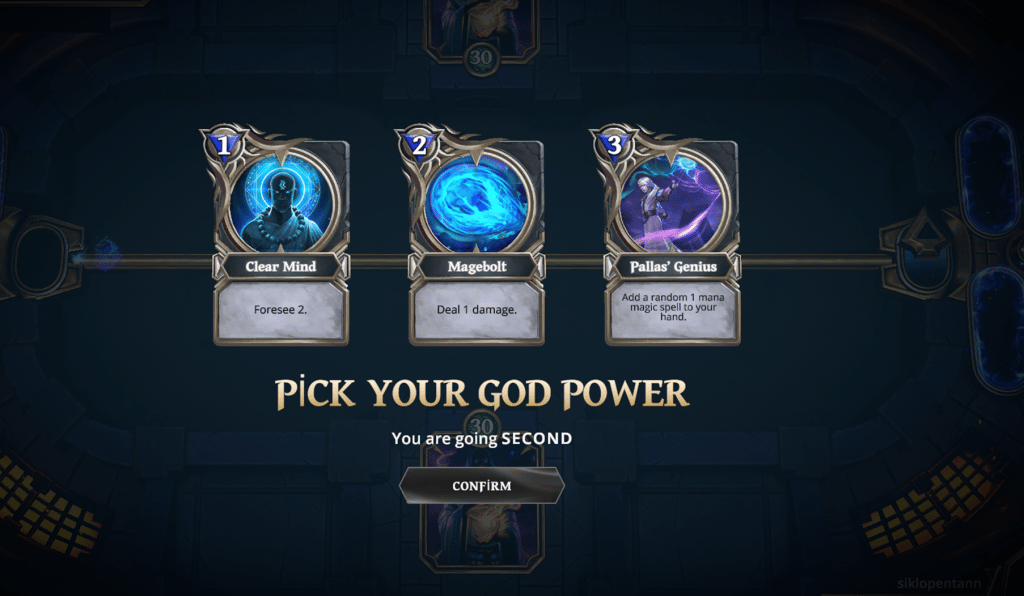
Decks for Gods Unchained are typically purchased with real money. However, they must have considered the new players by giving away 30 cards for free.
Of course, the strength of this free deck is questionable. You need a deck of 30 cards in total in order to play.
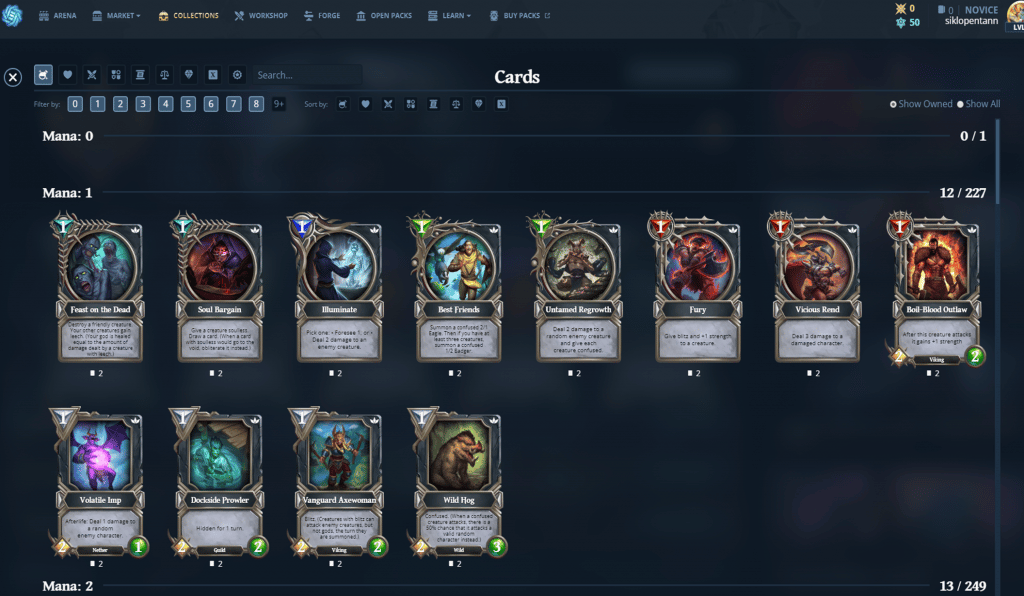
After making sure I had enough cards, I began the game by entering a random mode. First of all, the game works on a round-by-round basis.
You and your opponent have the right to play your cards during each turn.
To use the cards, you must have extra “Mana.” At the bottom right of the screen, a circle in which your mana is displayed.
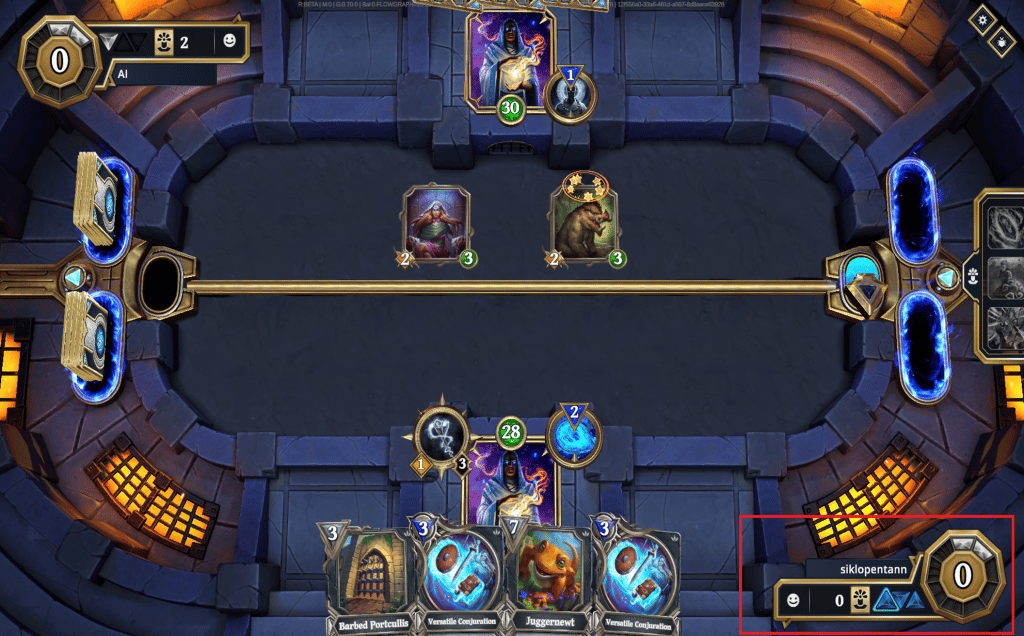
The fact that each card in your hand has a different mana value is another important fact. For example, if you play a card that costs 5 mana, your mana value for that turn will be -5.
The different features of the cards increase with their mana values.
For example, a card that costs 9 mana may contain powerful spells that will affect every card held by the opponent. Or you can have a card with high attack power.
When creating your 30-card deck, keep mana efficiency in mind. Because you will always lose in the early game if your deck frequently consists of cards with high mana value. Or, if your deck entirely consists of cards with little mana value, you will lose the game 100%.
Keeping the mana balance depends on the cards in your hand and the strategy in your head.
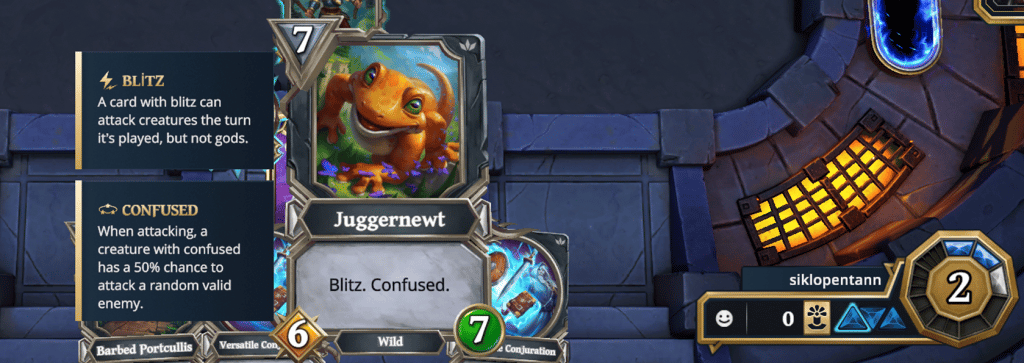
The strategy phase of the game begins when you face your opponent and destroy each other’s cards. It is entirely up to you to try to defeat the opponent by understanding the dynamics of the cards in your hand.
Your main goal is to keep moving forward until you destroy the opponent’s God. Of course, the enemy cards will be an obstacle in front of you so their God will not be damaged.
However, you will win the game if you can strategically use the cards in your hand to reduce the God’s 30 life to 0.
As you can see, Gods Unchained is an equivalent of MTG and Hearthstone. You create your own deck and choose a god for yourself. Gods Unchained has every aspect of gameplay that a card game should have.
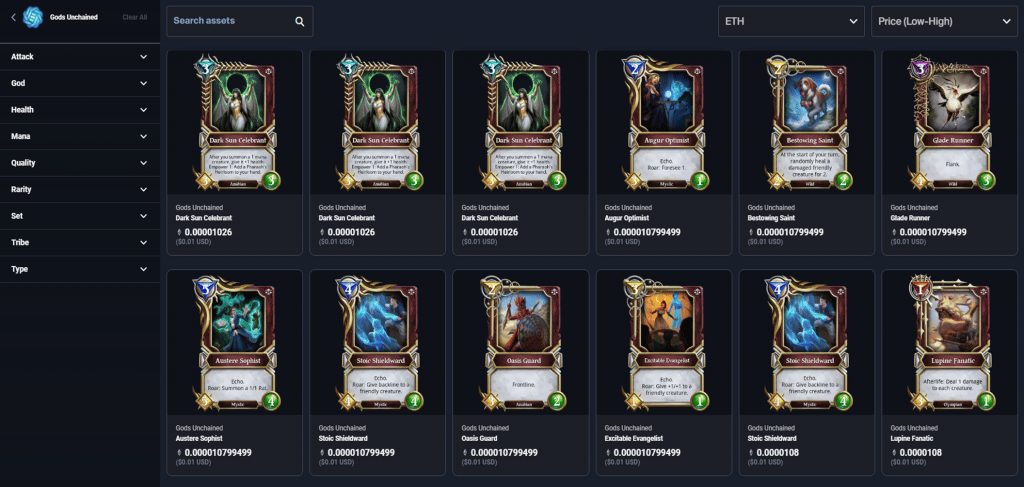
Let’s say you’re playing Hearthstone – a game that has a massive variety of cards. Some cards can be extremely valuable and hard to obtain.
Similarly, Riot Games’ card game Legends of Runeterra has almost 1,000 cards.
What would happen if the cards you used in these games had a monetary value? Have you ever considered what if you had the possibility of selling all of your Hearthstone cards for real money? This is where Gods Unchained outperforms its competitors by combining gameplay mechanics with the Ethereum network.
Gods Unchained may not be as big as Hearthstone, MTG, or Runeterra. However, it’s incredibly admirable that it combines the Gods token and the play-to-earn mechanic.
In the future, I believe that if the number of cards grows bigger and the meta effect is reduced, it will provide players with both extremely profitable and entertaining opportunities.
Story (2)
Stories are essential, whether it’s a typical game like Red Dead Redemption or a crypto game like Star Atlas (Check out our Star Atlas Review!). We can’t expect a player to deeply connect with a game unless it has a good storyline.
Some might even say, “How do you expect the story to be in the card game?”
For this reason, I’d like to introduce you to an anime series that debuted in the 2000s – Yu-Gi-Oh! Most card game enthusiasts love this series. Thousands of people like me have developed a strong bond with card games thanks to Yu-Gi-Oh’s story.
Yu-Gi-Oh’s card game is played by 20,000 – 30,000 players live on Steam. Additionally, the game’s story continues to be quite popular.
So why does Gods Unchained doesn’t have a story? Chris Clay, a former Magic: The Gathering executive, is in charge of Gods Unchained.
I’m curious if he made any story suggestions to the development team. Once more, as an illustrative example, the main story of Hearthstone features numerous World of Warcraft items. Additionally, players are very excited about combining card games and fantasy stories.
Four different game modes were available when I first entered the game. To be honest, I expected a tutorial-style story mode. The following are the available game modes in Gods Unchained:
- Weekend Ranked
- Direct Challenge
- Tutorial
- Solo
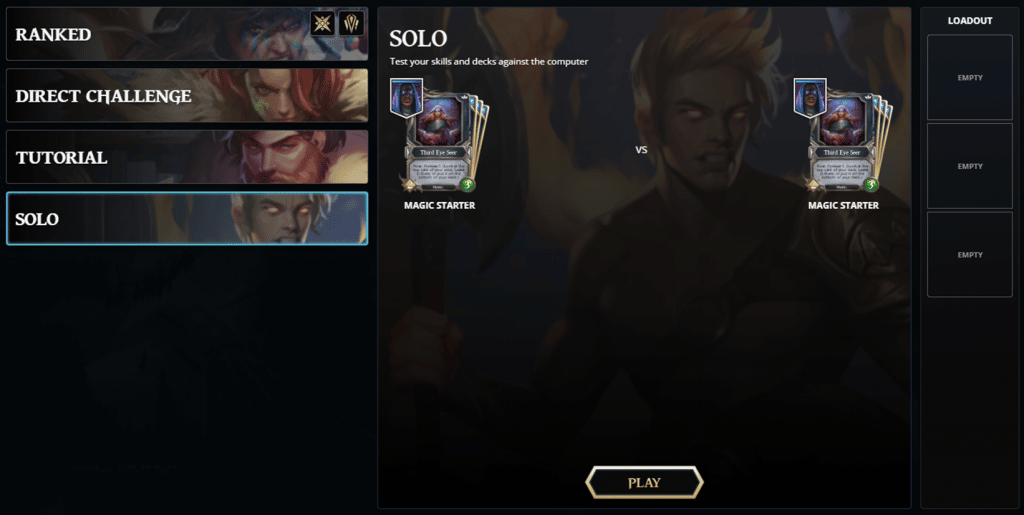
You can see that there’s nothing here that could qualify as a story. After considering all of this, I wonder what purpose GU serves aside from earning Gods tokens.
Since card games are a very niche type of game, the number of players is usually extremely low. Not having a compelling story will not help bring in new players.
Music Review (7)
I also enjoyed Gods Unchained’s soundtrack as a fan of Hearthstone’s tavern-style music.
There isn’t a lot of in-game music, but there is some, and it’s used to the game’s atmosphere.
For example, the war music has some lovely melodies.
The background music while you play can help you relax because it doesn’t have a particularly upbeat tone.
The second song is precisely like the lively tavern music from Hearthstone. This, in my opinion, is the ideal musical genre for a card game.
In addition, despite the game’s complexity, it’s mildly entertaining and helps you relax. I really wish there was more music in the soundtrack. They did a good job, and hearing more of it would be great.
All things considered, GU did a good job with the music. I hope the game’s soundtrack and narrative will be expanded in the future.
Tokenomics (7)
As I said, Gods Unchained is a card game that uses the play-to-earn method. The ERC-20-based GODS token is essential to the game’s earning method.
In other words, you can simply use an Ethereum-based network to sell the game’s items.
All objects in the Gods Unchained universe can be created as NFTs or used for NFT earning. Moreover, those who own GODS tokens can have a say in the game’s future.
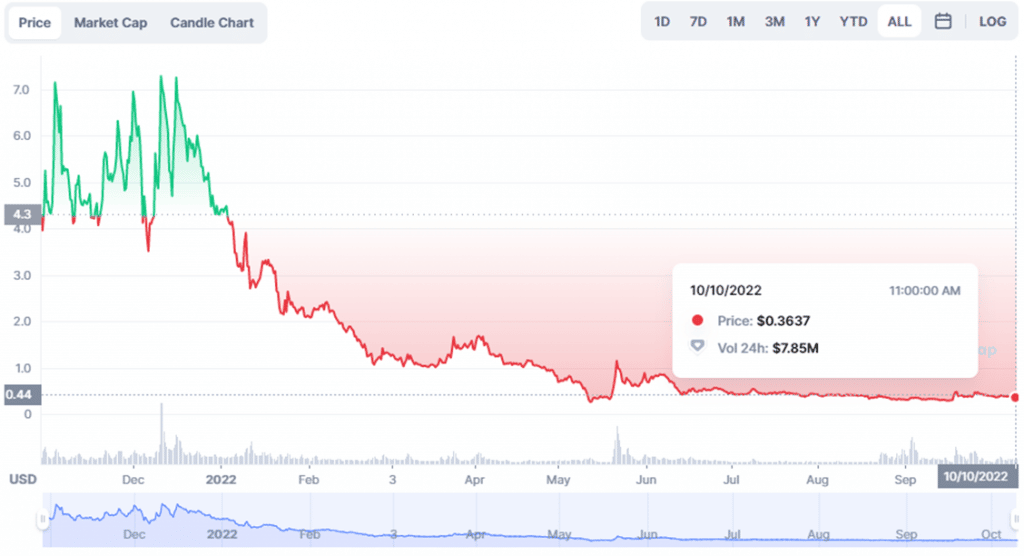
When looking at Ethereum-based crypto games, gas fees on the blockchain are a problem. Due to Ethereum’s transaction fees, players had a hard time doing in-game trading.
Since the same issue concerns the GODS token, innovative technology was required. That was when Immutable X came to the help of GODS.
With the help of Immutable X, players can avoid paying outrageous fees on all game trading transactions.
Where Are GODS Tokens Used?
GODS tokens can be used in a variety of ways throughout the game. Gods Unchained’s new cards and packages are the most important among these.
You can produce or sell cards as NFTs. Alternatively, you can stake your GODS tokens to earn rewards. By the way, you need to connect your Metamask wallet to the game in order to complete all of this.
GODS Token Distribution
Token distribution is crucial for ensuring the project’s continuation and future. According to the white paper of GODS, the total supply is 500.000.000.
And this is how they’re being distributed:
| Play to Earn Rewards | 34% |
| Gods Unchained Reserve | 25% |
| Community & Ecosystem Fund | 20.5% |
| Community Allocation | 7% |
| Token Foundation | 6.5% |
| Token Sale | 7% |
Overall, the way that GODS distributes its tokens is quite good. It’s best for players who spend most of their budget on play-to-earn prizes.
I believe 25% of the budget should be set aside to support the community and ecosystem.
Community Review (8)
I prefer to separate the community review of Crypto games into two parts. Because while there’s always a genuine community of players in games, There are also those who prefer Crypto gaming only for investment purposes.
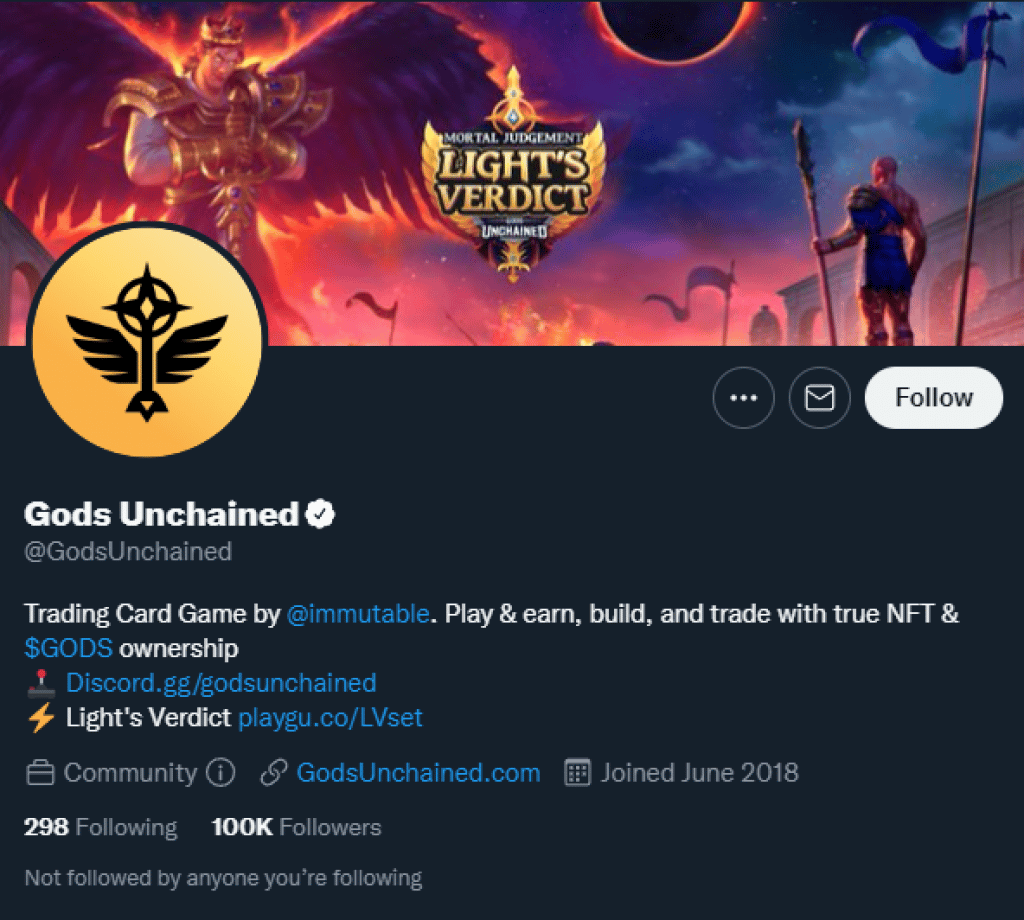
First of all, let’s take a look at those who prefer GODS for investment purposes. Currently, Gods Unchained has more than 100,000 followers on Twitter and Discord.
As I mentioned at the beginning of this Gods Unchained review, most GODS token owners may have a say in the game’s management. This, in particular, demonstrates how closely crypto gaming is tied to the community.
However, the majority of Gods Unchained’s followers are those who are interested in investing. Many investors are looking for ways to increase their profits, like the GODS token.
However, how much this situation improves the game raises many doubts in the players’ minds.
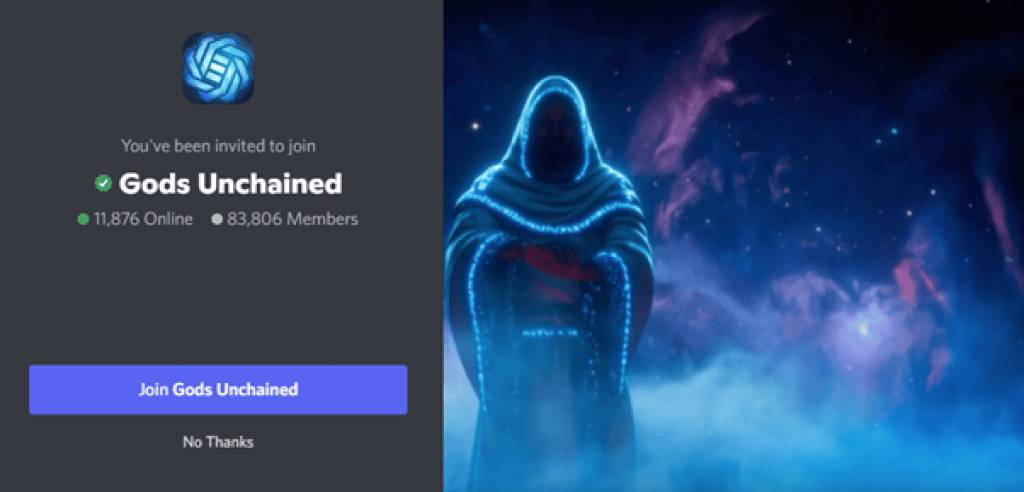
The Gods Unchained community’s genuine gamers are another part. By looking at Gods Unchained’s Esports section, we can see that they are a minority.
The main event of Gods Unchained, a series of tournaments, took place in March 2022. Throughout that tournament, there was hardly any interaction. Despite the $7,000 prize in the grand finale, the number of viewers was quite mediocre.
This shows that the gameplay aspect of Gods Unchained is not very important to the community.
Now I’d like to show you the final differences between GU, which has been active for 4 years, and Runeterra:
Legends of Runeterra Final:
You can see the difference, right?
When we look at this, it’s easy to understand that the future of Gods Unchained will be determined by investors.
Earning Ability (7)
My favorite aspect of Gods Unchained is that it is completely free: you are not forced to buy something in order to play.
Everyone is already given a deck of cards to use as the game’s starting hand. You have the option to purchase new cards if you want to improve yourself even further.
The opportunity for the player to make money is something else I like about this game. So let’s look at how you can profit from Gods Unchained.
Having cards is the key to playing the game and making money. Depending on their rank, players can have 5 different types of cards in the game: Plain, Meteorite, Shadow, Gold, and Diamond.
Typically, completing tasks or leveling up will reward you with new cards. If you’re lucky enough to receive a valuable card, you could get a lot of money for it.
Every week, ranked matches and tasks are available on Mondays.
You can make a stable income if you are able to complete these tasks on a regular basis. By completing these new tasks, you have a chance to earn tokens.
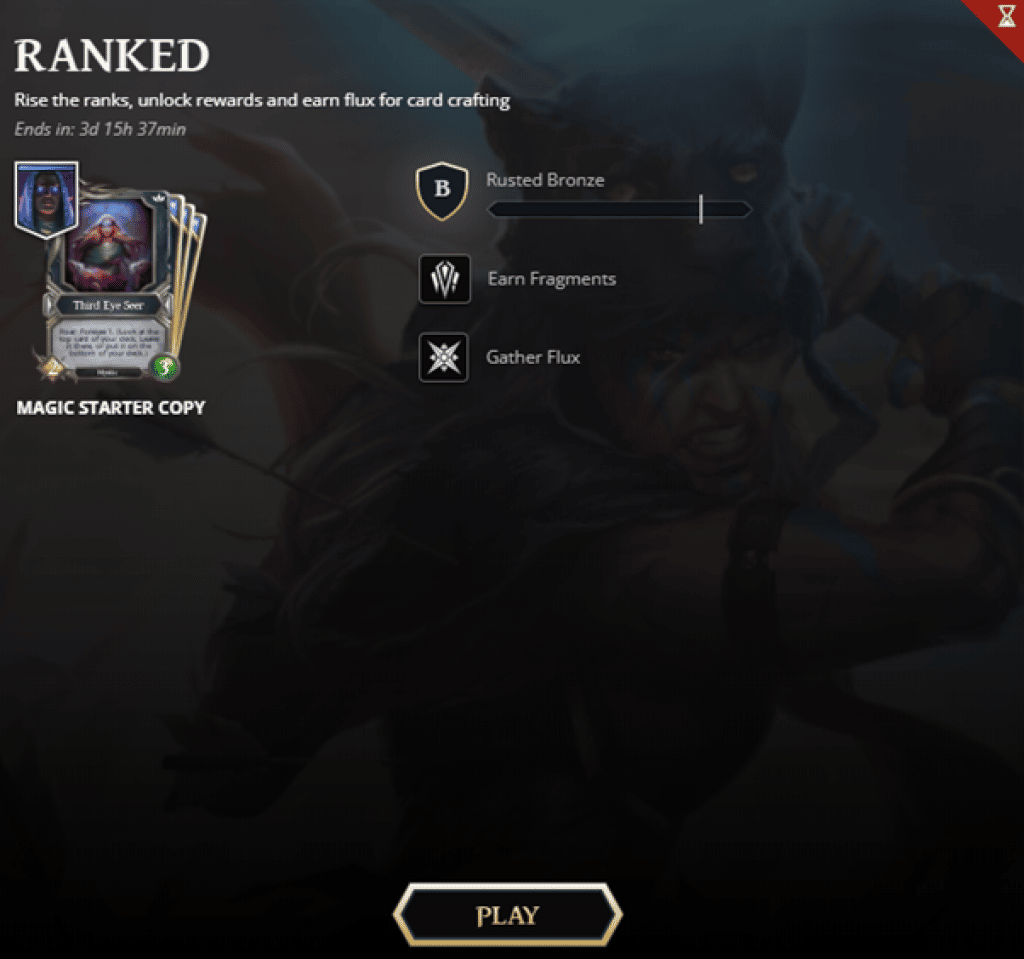
The “Gods Token Airdrop” rewards are a different way to make money. If you win 7 of the 20 games you play each week, you’ll be able to get these rewards.
Additionally, the game has a mechanism to generate new cards using Forge.
You might attempt to combine two identical cards in your hand, for example, to create a new card. If the newly created card is a “Meteorit,” you can print it as an NFT and sell it.
Of course, staking transactions are also important. You can periodically earn interest by staking your GODS tokens on the Immutable X platform. You can find detailed information on the game’s page if you’re interested in staking GODS.
Since I enjoy playing card games, I’ll probably try to spend more time playing Gods Unchained.
This game provides both its investors and players with great earning opportunities.
Participating in the weekly ranked matches seems particularly important because the number of participants may affect how many tokens are distributed.
Frequently Asked Questions
How much does Gods Unchained cost?
The GODS token is in a far different state than when it peaked in November 2021. Its cost in these months a year ago varied between $4 and $5. On October 10, 2022, the value of GODS was exactly $0.3583.
Can I play Gods Unchained on mobile?
There isn’t a mobile version of Gods Unchained available right now. But It’s known that the mobile version is being developed. At this time, we cannot give a precise release date for the Gods Unchained mobile version.
Can you sell cards in Gods Unchained?
Definitely yes. In Gods Unchained, all of your cards can be sold as NFTs on the Immutable X platform. To be more precise, you can sell or trade any non-grey card for NFT.
What wallet do I need to play Gods Unchained?
We highly advise using the MetaMask wallet if you plan to play Gods Unchained actively and are thinking about selling NFTs. Because NFT can be exchanged for Gods Unchained on the Immutable X platform, MetaMask is compatible with that platform.
How many Gods Unchained players are there?
There are reportedly over 450,000 players registered for the game. However, as of January 2022, it’s estimated that there were 80,000 weekly active players. We also want to draw attention to the fact that players in the game have traded over $52 million in assets.
The Bottom Line
Today we reviewed one of the top games in the crypto games industry. I want to express my appreciation for Gods Unchained design, which is reminiscent of Hearthstone and MTG-style gameplay.
But despite the years passing, I was a little disappointed that the game’s popularity remained low on the big scale of things, even considering that the number of players who play card games is already quite small.
Gods Unchained may not even have 10,000 players who are actively playing. Eventually, it makes me wonder if the game is gradually dying.
Given everything, Gods Unchained’s popularity may have reduced. However, we still don’t know the game’s developers’ plans for the future.
Gods Unchained is the world's first decentralized competitive card game. Building upon the lessons learned from games like Hearthstone, MTG, and Faeria, Gods Unchained turns the traditional card game experience into a truly community-focused affair. With a unique combination of decentralization, transparency, and immutability, Gods Unchained offers players the ability to play cards with real value.
- The graphics and gameplay are both quite enjoyable. As I tested the game, I discovered that it didn’t differ significantly from other well-known titles like Hearthstone or Magic: The Gathering.
- Gods Unchained provides some pretty fantastic opportunities for play-to-earn gameplay. You can make good profits whether you’re an investor or a player.
- There is an established system, and there aren’t any complicated road maps or steps to follow.
- Despite being a high-quality game, investors make up most of the community. There aren’t many people that focus on the “game” aspect of the game.
- The new game expansions are coming out very late. Eventually, players lack access to elements that could guarantee game continuity.
- The GODS token price is very volatile. Investors are pretty hopeless, as it is far from its peak days.
Vova Feldman
Entrepreneur, inventor, investor, crypto believer. Always trust the process, persist, and don't let the a-holes get you down.






